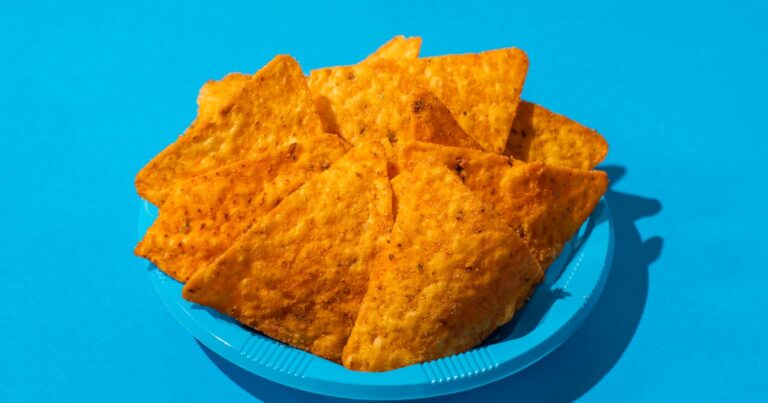
[ad_1]
If you’ve been on TikTok recently, you’ve probably heard of the viral Dorito Theory. But, in case you need a quick refresh, here’s the gist: It’s tied to the idea of instant gratification. And, as you can probably surmise by the name of the theory, it centers around a classic chip: the humble Dorito. Some people claim this theory is a helpful tactic for making life decisions. But hot take? The Dorito Theory is mostly garbage.
What is the Dorito Theory, really?
TikTikers are using The Dorito Theory, a trend which seems to have originated on the platform with TikToker Celeste Aria (not to be confused with The Dorito Effect, a book by Mark Schatzker that focuses on food flavor and technology), to discuss instant gratification. The idea is simple enough: Doritos are delicious but don’t fill you, so soon enough, you need to be satiated again. In other words, instant gratification can leave you hungry in the long run.
When this theory started to take off on the platform, people began applying it to all sorts of life choices.
For finances, for instance, someone might say that spending $50 on the latest cute stuff from Target will leave you pleased in the moment, but saving that $50 in your travel fund will help you take a vacation that leaves you feeling better for longer. You can also tie it to the cheap, trendy clothes that wear out in a season or two versus investing in nicer pieces that might last longer.
On the surface, this theory seems innocuous. It’s decent advice. Cute stuff from your favorite discount store usually ends up in the yard sale or donation bins in a couple of years, but you’ll never regret memories made on vacation.
What’s the problem then? Well…
The Dorito Theory is tone-deaf.
It starts shaming the way people eat, which doesn’t take into account many things — namely financial restraints and food insecurity. In many houses, Doritos (or Dorito-sized budgets) are simply what’s accessible.
Running with the Doritos theme, if you were to reach for Quest Protein Chips, a “healthier” alternative to Doritos, they’d cost $22.99 for an 8-pack, while Doritos are $6.69 for a 10-pack.
Didn’t we agree to stop shaming people for what they can and can’t afford years ago? Making the “choice” for junk food isn’t always about giving in to instant gratification — for many people, it’s just about buying the food you can afford.
I understand that Doritos here are a metaphor for all things that are highly addictive and not satiating, but it’s still rooted in a basic food choice.
It overlooks the value of “little treat culture.”
You’ve seen the meme. Good day? Little treat to celebrate. Bad day? Little treat to make it better. If a bag of Cool Ranch Doritos keeps an amazing but tired nurse from walking out mid-shift, buy the f*cking Doritos. Little treats aren’t always silly or unnecessary; sometimes, they’re the thing that gets you through the day.
The Dorito Theory’s Expert Takeaway
“From the Dorito Theory to benign neglect to celebrating inch stones, there are always new parenting trends, and with each comes an influx of advice,” shares Gigi Schweikert, parenting expert and CEO of Lightbridge Academy. “Parents must understand and remember that each family has its own distinct dynamics and circumstances. While certain trends or advice may resonate and prove effective for one family, others may not align with the same needs or values.”
If using the Dorito Theory perspective works for you, awesome. Most people posting their spins on the theory are probably only doing so to share how it helps them and not to shame others. If the Dorito Theory reminds you to skip Starbucks this month or not answer your text alert during your kid’s recital, amazing.
But if you’re overwhelmed by yet another “theory” on how we should all be making decisions and living our lives, just know you’re not alone. The Dorito Theory, no matter how you spin it, is just mental gymnastics that some people are using to help themselves sort out their sh*t.
As Schweikert suggests, “Take it all with a grain of salt — just because it’s the new ‘trend’ doesn’t mean it’s right for you or something you would even agree with, and that’s OK.”
[ad_2]